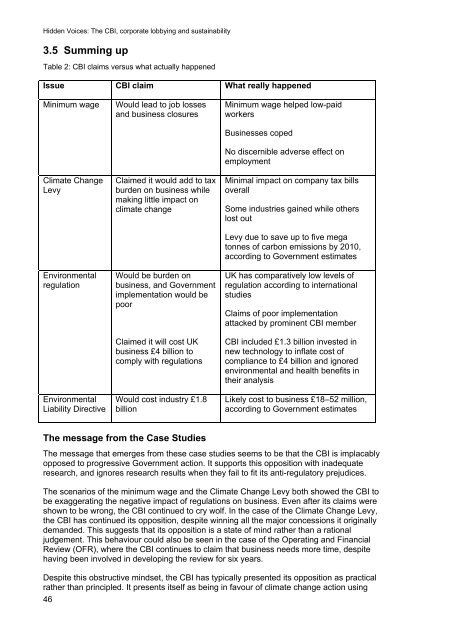hidden_voices
hidden_voices
hidden_voices
You also want an ePaper? Increase the reach of your titles
YUMPU automatically turns print PDFs into web optimized ePapers that Google loves.
Hidden Voices: The CBI, corporate lobbying and sustainability3.5 Summing upTable 2: CBI claims versus what actually happenedIssue CBI claim What really happenedMinimum wageClimate ChangeLevyEnvironmentalregulationEnvironmentalLiability DirectiveWould lead to job lossesand business closuresClaimed it would add to taxburden on business whilemaking little impact onclimate changeWould be burden onbusiness, and Governmentimplementation would bepoorClaimed it will cost UKbusiness £4 billion tocomply with regulationsWould cost industry £1.8billionMinimum wage helped low-paidworkersBusinesses copedNo discernible adverse effect onemploymentMinimal impact on company tax billsoverallSome industries gained while otherslost outLevy due to save up to five megatonnes of carbon emissions by 2010,according to Government estimatesUK has comparatively low levels ofregulation according to internationalstudiesClaims of poor implementationattacked by prominent CBI memberCBI included £1.3 billion invested innew technology to inflate cost ofcompliance to £4 billion and ignoredenvironmental and health benefits intheir analysisLikely cost to business £18–52 million,according to Government estimatesThe message from the Case StudiesThe message that emerges from these case studies seems to be that the CBI is implacablyopposed to progressive Government action. It supports this opposition with inadequateresearch, and ignores research results when they fail to fit its anti-regulatory prejudices.The scenarios of the minimum wage and the Climate Change Levy both showed the CBI tobe exaggerating the negative impact of regulations on business. Even after its claims wereshown to be wrong, the CBI continued to cry wolf. In the case of the Climate Change Levy,the CBI has continued its opposition, despite winning all the major concessions it originallydemanded. This suggests that its opposition is a state of mind rather than a rationaljudgement. This behaviour could also be seen in the case of the Operating and FinancialReview (OFR), where the CBI continues to claim that business needs more time, despitehaving been involved in developing the review for six years.Despite this obstructive mindset, the CBI has typically presented its opposition as practicalrather than principled. It presents itself as being in favour of climate change action using46


